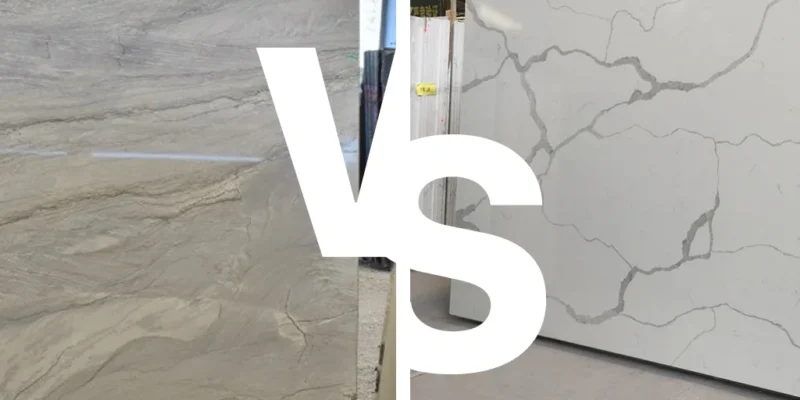


Before choosing between quartz and quartzite, it’s important to understand what sets them apart at the core. Quartz countertops are engineered surfaces made by combining natural quartz crystals with resins and pigments. This results in a highly customizable, durable surface that’s non-porous and low-maintenance.
Quartzite, on the other hand, is a 100% natural metamorphic rock formed when sandstone undergoes heat and pressure. It’s mined and cut into slabs, much like marble or granite. Its natural veining and color variation make it a luxurious choice for homeowners who prefer organic aesthetics.
Both materials offer a beautiful appearance, but their origins and structure play a big role in their differences – and how they perform in Canadian homes.
Quartz offers virtually unlimited design possibilities. Since it’s man-made, manufacturers can replicate marble, concrete, or granite effects while also offering consistent color and pattern across slabs – a feature that’s ideal for large kitchens or matching island and perimeter surfaces.
Quartzite provides a more natural, one-of-a-kind look. Each slab is unique, often featuring dramatic veining and a crystalline shimmer. For Canadian homeowners seeking a luxurious, earthy feel, quartzite makes a stunning statement.
In 2025, the design trend is all about blending soft neutrals with bold natural textures – both quartz and quartzite deliver, but quartz offers more predictability, while quartzite delivers organic uniqueness.
Quartz is engineered to resist scratching, cracking, and chipping. Its resin content helps absorb impact and makes it less likely to stain. This is ideal for busy Canadian households where spills and messes are frequent – especially during long winters when cooking at home is more common.
Quartzite is harder than granite and highly scratch-resistant, but because it’s natural stone, it’s more porous. This means it requires regular sealing to resist staining from common kitchen items like wine, oils, or tomato sauce.
In terms of durability under Canadian climate conditions, both perform well indoors.
Quartz resists stains well but is less heat-resistant due to its resin content. Placing a hot pan directly on a quartz countertop can cause discoloration or cracking – always use a trivet.
Quartzite handles heat better, thanks to its natural mineral structure. It’s more forgiving with hot items, making it a preferred choice for those who cook frequently or use hot pots directly on the counter.
So, if heat resistance is a top priority for your kitchen in Canada, quartzite might be the better fit.
This is one of the most significant deciding factors for many Canadian homeowners.
If you want a low-maintenance kitchen, especially in a household with kids or a fast-paced lifestyle, quartz is the winner here.
In 2025, pricing depends heavily on supply chains, finishes, slab size, and fabrication complexity. Here’s a general price range for the Canadian market:
Quartzite is generally more expensive due to its rarity and difficulty in fabrication. But if you’re investing in a high-end kitchen renovation in cities like Toronto or Vancouver, the added cost may be justified by its aesthetic impact.
If you’re working with a budget-friendly remodel in Calgary or Ottawa, quartz can give you style and durability at a lower cost.
Canadian homeowners are becoming increasingly eco-conscious. Quartz, being man-made, often includes recycled materials and offers a controlled manufacturing process that minimizes waste.
Quartzite is natural but requires quarrying, long-distance shipping, and more energy-intensive cutting and polishing – especially if it’s imported from Brazil or Europe.
So if environmental sustainability is a priority, locally sourced quartz from reputable Canadian fabricators like Teccorp Stone may be a greener option.
Quartz is easier to fabricate due to its predictable structure. Cuts, edges, and seams are simpler for installers to manage, leading to a smoother installation process – especially helpful in winter months when construction timelines in Canada are tighter.
Quartzite, being denser and more brittle in spots, requires specialized tools and experienced installers. If you choose quartzite, always work with a certified stone expert like Teccorp Stone to ensure precision and safety.
Choosing between quartz and quartzite for your Canadian kitchen in 2025 comes down to your lifestyle, design preferences, and maintenance tolerance.
Choose quartz if you:
Choose quartzite if you:
At the end of the day, both materials offer exceptional performance and elegance. But the best way to decide is to visit a local showroom, like Teccorp Stone, and see the slabs in person.
Let your kitchen reflect your taste, your habits, and your Canadian lifestyle — beautifully and functionally.